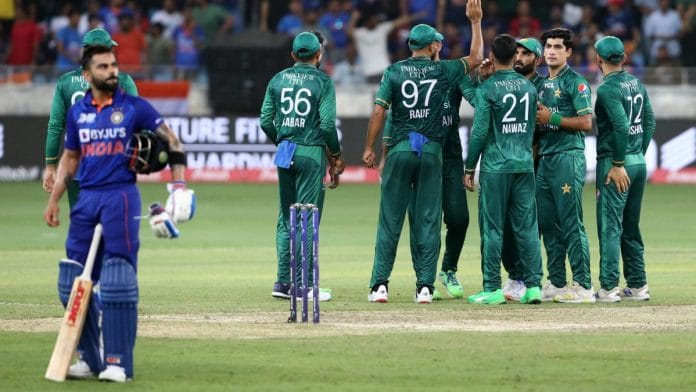On 24 October 2021, Shaheen Shah Afridi demolished the star-studded Indian batting lineup—Rohit Sharma, K.L. Rahul and Virat Kohli—before Pakistani batsmen ensured a comfortable 10-wicket victory over India, with 13 balls to spare. That was last year’s T20 World Cup in Dubai.
That hurt, real bad. I have supported my team since…I don’t remember when. Ok, from the time I mastered the art of fixing the Doordarshan antenna, asking “aaya kya” (the TV signal) while standing atop the terrace. I have seen worse days though, on a grainy black and white Texla TV with one hand on my heart and the other on the vertical-hold knob to ensure a clear transmission for my family members. Like when Saeed Anwar took apart Indian bowlers in May 1997. That 194 left a scar. But you knew your team just wasn’t good enough for the Pakistanis of that era. And that meant living with that bitter truth amid all the agony in the heart. And a hope, that someday, Sachin will settle scores with the neighbours.
Analysts have given many reasons for last year’s loss—from team selection to the timidity Indians displayed on the ground. Like any other Indian fan, I am also an expert. It’s cricket, you see. But my reasons for the loss were different.
They say, keep your friends close and your enemies closer. Ok, not enemies, for all political correctness. But adversaries the Pakistanis definitely are. And that’s one thing we haven’t done for over a decade now. We don’t play them anymore in bilaterals, so we don’t know them. Simple as that. And as long as that continues, we will keep seeing the Shaheen Shah Afridis and Naseem Shahs—‘The boy who rattled India and almost won the game for Pakistan’ earlier this year in the Asia Cup—springing surprise after surprise.
During the 2021 T20 World Cup match, one of the commentators had observed about the cheaply dismissed Indian batters: “They cannot play him (Afridi) and Indian fans look on in disbelief.” Afridi ended India’s hopes of bringing the T20 World Cup back home after 14 years.
No amount of studying the match footage of your adversary—where you see them execute their skill in slow motion to decode their mystery and mastery—will give you the required match confidence. Match confidence is a learning form that remains matchless, cricket or not.
If the loss in league matches of ICC and Asian Cricket Council tournaments is so hurtful, imagine what the Men in Blue fans will bleed if we lose to the green jersey in a final? And after all the drama and broken hearts, chairs and fan fists around the loss settles, another cricket expert would tell you that you lost because you didn’t know your adversary well. Whose loss will it be then?
Also read: Babar, Rizwan, Afridi crush Team Kohli as Pakistan ends World Cup losing streak against India
Letting a chance go
It’s not to doubt the talent powerhouse that Team India today is; they can and have won matches against the archrivals in ICC tournaments to keep the slate clean as late as last year. But if covering all bases can give us better results at prestigious ICC and multi-lateral outings, then why not? In ICC tournaments, India’s dry run continues since the 2013 Champions trophy victory.
We have had a better team than theirs for most part of the last two decades but a look at stats will tell you that Pakistan still has 18 more wins in ODIs against India in head-to-head clashes. Their Test win record also remains better. By not playing, we have let go of a golden window.
However, as of now, the stats in ICC tournaments are on India’s side. Since 1992, the two teams have clashed on seven occasions in ODI World Cups, and Pakistan is yet to beat India. In T20Is too, India has registered eight wins over Pakistan’s three. Since 2000, the two countries have played 55 ODIs and India has won on 28 occasions while Pakistan 26. One match was abandoned. The record is nearly matched by Pakistan despite India having a better team for the most part of the last two decades.
So why leave even an iota of chance for the rivals and risk your chances in high-profile tournaments when playing them in bilaterals can prepare India better?
Play with them a five-match Test series. Beat them. Even if you lose, you will learn. Invite them to the greenest of wickets we now have in India and restrict them to a lowest total. India has ample pace-charge now. Play ODIs, T20s, even if it’s in Dubai. Don’t want peace with them? Don’t have it. Just drop cricket from that list of don’ts between the two countries. Invite them over, take revenge of past defeats and better your stats against them—that’s also rivalry. And when it comes to sports, I prefer it this way.
When athletes from rival countries hit the ground, they come with their respective energy bubbles holding their cricketing culture and surprises. And it takes one statement from the umpire to burst those bubbles: ‘let’s play’. With that begins a collective exchange of knowledge and skill and the art of knowing your adversary.
And it’s not limited to the ground. When former players from rival countries share the commentary box, an exchange of the game’s wisdom happens there as well. Take for example the disagreement between Wasim Akram and Gautam Gambhir (the two commentators during the Asia Cup clash between India and Pakistan) on how a T20 game should be approached.
When India take on Pakistan on 23 October, we would have played them on four occasions in 364 days. Hopefully, I won’t have to read a similar result. Like this one from Asia Cup earlier this year on 4 September:
‘Pakistan won by 5 wickets with one ball to spare.’
Because we have some match experience and that comes from playing with your adversary.
Views are personal.
(Edited by Prashant)






